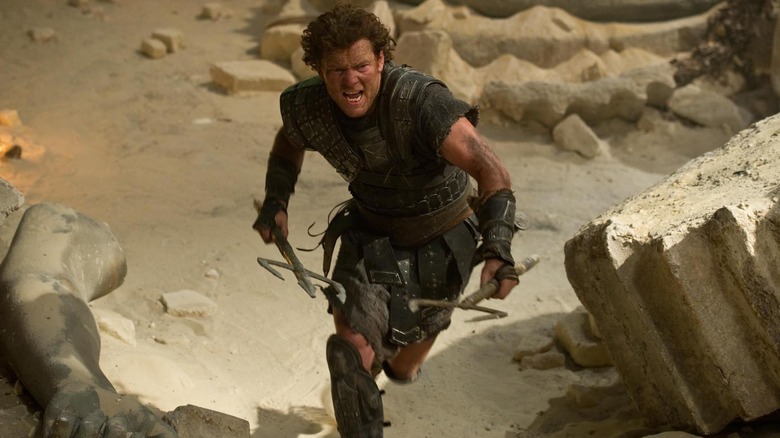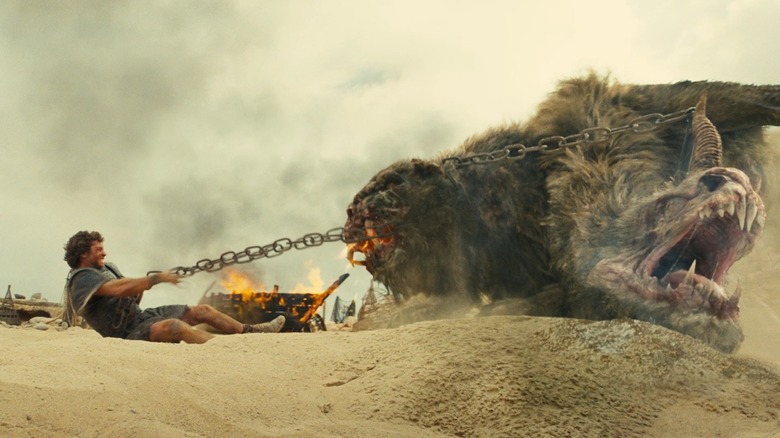A Greek Mythology Movie Is A Netflix Hit Despite Its 26% Rotten Tomatoes Score
Although the film was critically panned when it came out in 2012 — yes, it only has a 26% approval rating on Rotten Tomatoes — Jonathan Liebesman's peplum flick "Wrath of the Titans" is attracting a large audience on Netflix. "Wrath of the Titans" is a sequel to Louis Leterrier's 2010's ugly-ass 3D film "Clash of the Titans," itself a high-octane remake of the glittering 1981 fantasy epic directed by Desmond Davis and starring Harry Hamlin.
All three films concern the adventures of the Greek hero Perseus, played by Sam Worthington in the remakes. In "Clash of the Titans," Perseus' adventures contain some of what you remember from studying Greek mythology in elementary school. He is the illegitimate son of Zeus, born to the human woman Danae. He grows up, raised by fishermen, in the city of Argos. When he turns 18, the king and queen of Argos have waged a war on the gods, inciting their wrath. Hades (Ralph Fiennes) appears to the court and says that they have to sacrifice the princess Andromeda (Alexa Davolos) or else he will unleash the Kraken, a giant sea monster. Liam Neeson plays Zeus, and Perseus fights Medusa. Gemma Arterton plays Io, and there are small roles for Mads Mikkelsen, Nicholas Hoult, Pete Postlethwaite, and Jason Flemyng.
The film is terrible, but it made over $493 million at the box office (!), meaning a sequel was inevitable. The sequel extrapolated from Greek myth and concerns a bizarre wrinkle: the gods are losing their powers because human beings have stopped praying to them. One might think that faith was easy to come by in a universe with Krakens, gorgons, and gods appearing in person, but never mind. Hades and Ares (Édgar Ramírez) team up to steal Zeus' thunderbolt and ... well, the plot continues apace.
It's all very witless.
Wrath of the Titans is absolute nonsense
The plot, to get back to it, is more reminiscent of a fetch-quest video game than anything one might encounter in ancient texts. Perseus, now 10 years older, is told by Zeus that if the gods lose their powers, then the walls of Tartarus will fall, unleashing the Titan Kronos, a creature so powerful it can destroy the world and topple Mount Olympus. Hades and Ares have made a deal with Kronos; once he breaks free, they'll get to remain immortal in exchange for the power they can siphon from Zeus' body. Perseus will have to face Kronos himself. His goal is to assemble the Spear of Trium, a weapon made of Zeus' thunderbolt, Hades' pitchfork, and Poseidon's trident. It's not much more sophisticated than retrieving the Master Sword in "The Legend of Zelda."
Andromeda is back, now played by Rosamund Pike. Danny Huston plays Poseidon, and Billy Nighy plays Hephaestus. There are cyclopes, the Minotaur, and other godly beings as well.
The film is muddy, visually indistinct, and the action is largely generic. The "Titans" remakes were clearly made in the wake of the success of Zack Snyder's "300," and it bears the same ultra-stylized, ultra-masculine trappings of that film. Worst of all, it doesn't seem to be saying much. There is a vague theme pertaining to the function of faith in an evolving world, but it's not really explored. It's also an illogical theme in a world where the gods are very real and prove their direct influence on the human world on a daily basis.
Sam Worthing has accrued a bad reputation for playing thick-headed action heroes in films like "Terminator: Salvation" and the "Avatar" movies. Worthington is actually a capable performer who took on many action/genre films that didn't demand much of him. The "Titans" films only required him to be tough and taciturn.
It seems that it was enough to earn "Wrath" $302 million at the box office and a new life on streaming, though. So what do critics know?

